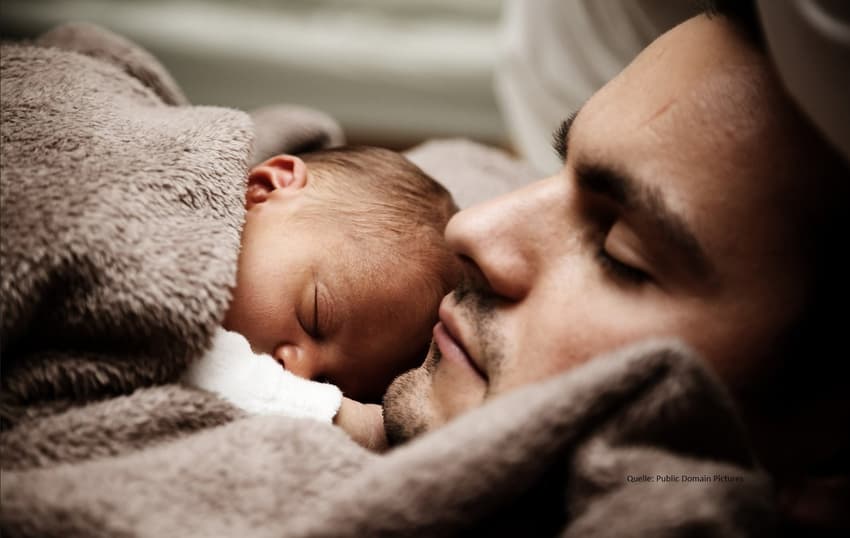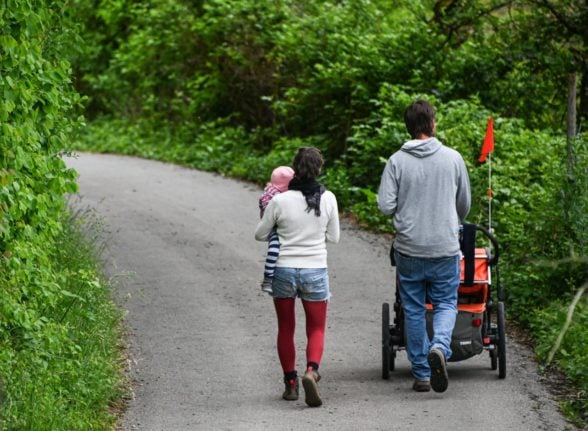'A horrible idea': How cuts to Elterngeld will affect families in Germany

Germany is on the cusp of slashing entitlement to parental leave for couples who earn €150k or more per year. Two parents offer their views on the changes - and how it could impact mothers in particular.
When Germany first introduced its parental leave system - known in German as Elternzeit with the option to apply for up to 14 months of Elterngeld - it was hailed as a step forward for gender equality.
Unlike Mutterschutz (maternity leave), which is solely for mothers before and after the birth of their child, Elterngeld offered an allowance of paid time off that both parents could split between them however they liked.
With up to €1,800 a month available to replace lost earnings, the hope was that fathers would have an easier time justifying time off work to take over childcare duties, and that mothers would also be able to dedicate more time to their child in that all-important first year.
As it stands, couples earning up to €300,000 per year between them can take paid parental leave, or €250,000 for single parents, meaning that all but Germany's wealthiest have an entitlement to Elterngeld.
READ ALSO: 60,000 families in Germany could no longer qualify for 'Elterngeld'
Recently, however, higher earning couples have been hit with the bombshell news that the government will slash entitlement to parental leave for those with a combined taxable income of €150,000 or more from 2024.
This has forced higher earning parents into difficult choices.
'Why should I not get a share of support?'
For Jessica*, a new mother living with her partner and daughter in Berlin, the planned changes have created a huge dilemma.
When her daughter was born last year, the couple decided to split the 14 months of parental leave between them - despite taking a massive hit to their income. With the news that the support will be docked from next year, however, she is faced with a choice between working less when she returns to work or losing out on tens of thousands of euros of support.
Jessica told The Local that her and her partner earn just over €150,000 - the new threshold for receiving Elterngeld - and that this has made it tricky for them to justify working full-time.
That means that, despite being the higher earner, she is likely to cut her own working hours.
"My partner already took three months parental leave and the attitude of many of his colleagues to this was not warm," she explains. "In the current market, we think he's pushed his luck as far as he dares. On the other hand, my managers have been very flexible with me as the mother of a very young child."
This gendered attitude to parental leave is likely to force more women to choose between their careers and their family life, Jessica fears. Many women who count as "well off" have only just reached this point in their careers after years of hard work, she points out, and will now be put at a disadvantage.

Parents hold hands with their child in Germany. Photo: picture alliance/dpa | Peter Kneffel
"I'm in a Berlin Mum's WhatsApp group and this problem is shared," she told us. "Many of us are women in male dominated industries and it really doesn't help our careers, but then how else do we bridge that gap?"
For Jessica and her partner, continuing to work full time would mean having to find around €25,000 over the next few years to compensate for the loss of Elterngeld when their next child arrives. "That's not going to happen," she says.
READ ALSO: Everything you need to know about parental leave in Germany
These cuts to social support could be the catalyst for young mothers to work less - the opposite of what the government is trying to promote - or even lead to an exodus of internationals returning to their home country.
"We pay our tax, and we choose to live and work in Germany," Jessica says. "Rent is expensive. Interest rates are expensive. Inflation is high. Why does the government want to remove this essential support from us, especially when we are in a vulnerable time in our lives?"
'Families will plan ahead differently now'
For other new parents, the choice to leave a country that no longer seems to provide enough support for families has already been made - and the cuts to Elterngeld were the final straw.
In the view of Dr. Tom Pleiner, a lawyer from Germany, the decision to slash parental leave for higher-earning parents feels "arbitrary" - and is likely to have far-reaching consequences.
With his wife's busy schedule as a dentist, Tom decided to take a full nine months of parental leave after the birth of his son in June 2022, but says the situation will change significantly when it comes to the birth of the couple's second child.
READ ALSO: Who is affected by Germany's proposal to reduce 'Elterngeld' eligibility?
"With our second kid we will for sure not be eligible for Elterngeld anymore," he told The Local. "With this overall climate in Germany, we decided to leave for Switzerland where we live now.
"In Switzerland, we have at least 3.5 months almost fully paid leave for my wife and 2 weeks for me as a dad. At the same time, taxes are much lower. We visited three different Kitas, which all offered a place for our son. If we want to see our pediatrician, we mostly go the same day. Public pools are for free and don’t need any security. These are just some points which made the decision to leave the country easy in the end."
In contrast, parents in Germany are facing a perfect storm, with a dearth of teachers and paediatricians, thousands of missing Kita places, outbreaks of violence in leisure facilities like outdoor swimming pools and now the cuts to Elterngeld.

A couple walk through a park in Germany with their young children. Photo: picture alliance/dpa | Felix Kästle
"The deal has always been: Germany has very high taxes and social contributions - in return, a lot of money is redistributed to those in need," Tom says. "This is getting more and more out of balance - Elterngeld being yet another slip."
Support for the move among the public is based on a misunderstanding of the realities of life with a joint income of €150,000 or more, Tom points out. Both he and his wife poured hundreds of thousands of dollars into their education at UCLA and studied for over a decade to get to where they are today.
Most worrying, though, is the fact that families will plan ahead differently now - in ways that Tom believes will disadvantage women.
READ ALSO: From Elternzeit to midwives: An American's perspective on having a baby in Germany
"Elterngeld has never been a social contribution but an incentive for more equality between parents," he explains. "It provided for a general acceptance of time off, as being paid. Nevertheless, I might have been the first dad doing this in our office of 200 people. Now, I was probably also the last one."
With expected savings of €400 million or so per year, the cuts feel even more nonsensical, says Tom, especially since the cuts could encourage high earners to cut their hours or even leave the country, resulting in even worse labour shortages and lower tax receipts.
"The government’s plans to scrap Elterngeld (for higher earners) are based on very bad judgement and overall a horrible idea," he summarises.
"Economic insecurity paired with less governmental help for families might, in a worst case scenario, lead to families postponing their offspring and possibly having fewer kids: the exact opposite of what a country needs."
*A pseudonym has been used to protect anonymity
Comments (1)
See Also
When Germany first introduced its parental leave system - known in German as Elternzeit with the option to apply for up to 14 months of Elterngeld - it was hailed as a step forward for gender equality.
Unlike Mutterschutz (maternity leave), which is solely for mothers before and after the birth of their child, Elterngeld offered an allowance of paid time off that both parents could split between them however they liked.
With up to €1,800 a month available to replace lost earnings, the hope was that fathers would have an easier time justifying time off work to take over childcare duties, and that mothers would also be able to dedicate more time to their child in that all-important first year.
As it stands, couples earning up to €300,000 per year between them can take paid parental leave, or €250,000 for single parents, meaning that all but Germany's wealthiest have an entitlement to Elterngeld.
READ ALSO: 60,000 families in Germany could no longer qualify for 'Elterngeld'
Recently, however, higher earning couples have been hit with the bombshell news that the government will slash entitlement to parental leave for those with a combined taxable income of €150,000 or more from 2024.
This has forced higher earning parents into difficult choices.
'Why should I not get a share of support?'
For Jessica*, a new mother living with her partner and daughter in Berlin, the planned changes have created a huge dilemma.
When her daughter was born last year, the couple decided to split the 14 months of parental leave between them - despite taking a massive hit to their income. With the news that the support will be docked from next year, however, she is faced with a choice between working less when she returns to work or losing out on tens of thousands of euros of support.
Jessica told The Local that her and her partner earn just over €150,000 - the new threshold for receiving Elterngeld - and that this has made it tricky for them to justify working full-time.
That means that, despite being the higher earner, she is likely to cut her own working hours.
"My partner already took three months parental leave and the attitude of many of his colleagues to this was not warm," she explains. "In the current market, we think he's pushed his luck as far as he dares. On the other hand, my managers have been very flexible with me as the mother of a very young child."
This gendered attitude to parental leave is likely to force more women to choose between their careers and their family life, Jessica fears. Many women who count as "well off" have only just reached this point in their careers after years of hard work, she points out, and will now be put at a disadvantage.

"I'm in a Berlin Mum's WhatsApp group and this problem is shared," she told us. "Many of us are women in male dominated industries and it really doesn't help our careers, but then how else do we bridge that gap?"
For Jessica and her partner, continuing to work full time would mean having to find around €25,000 over the next few years to compensate for the loss of Elterngeld when their next child arrives. "That's not going to happen," she says.
READ ALSO: Everything you need to know about parental leave in Germany
These cuts to social support could be the catalyst for young mothers to work less - the opposite of what the government is trying to promote - or even lead to an exodus of internationals returning to their home country.
"We pay our tax, and we choose to live and work in Germany," Jessica says. "Rent is expensive. Interest rates are expensive. Inflation is high. Why does the government want to remove this essential support from us, especially when we are in a vulnerable time in our lives?"
'Families will plan ahead differently now'
For other new parents, the choice to leave a country that no longer seems to provide enough support for families has already been made - and the cuts to Elterngeld were the final straw.
In the view of Dr. Tom Pleiner, a lawyer from Germany, the decision to slash parental leave for higher-earning parents feels "arbitrary" - and is likely to have far-reaching consequences.
With his wife's busy schedule as a dentist, Tom decided to take a full nine months of parental leave after the birth of his son in June 2022, but says the situation will change significantly when it comes to the birth of the couple's second child.
READ ALSO: Who is affected by Germany's proposal to reduce 'Elterngeld' eligibility?
"With our second kid we will for sure not be eligible for Elterngeld anymore," he told The Local. "With this overall climate in Germany, we decided to leave for Switzerland where we live now.
"In Switzerland, we have at least 3.5 months almost fully paid leave for my wife and 2 weeks for me as a dad. At the same time, taxes are much lower. We visited three different Kitas, which all offered a place for our son. If we want to see our pediatrician, we mostly go the same day. Public pools are for free and don’t need any security. These are just some points which made the decision to leave the country easy in the end."
In contrast, parents in Germany are facing a perfect storm, with a dearth of teachers and paediatricians, thousands of missing Kita places, outbreaks of violence in leisure facilities like outdoor swimming pools and now the cuts to Elterngeld.

"The deal has always been: Germany has very high taxes and social contributions - in return, a lot of money is redistributed to those in need," Tom says. "This is getting more and more out of balance - Elterngeld being yet another slip."
Support for the move among the public is based on a misunderstanding of the realities of life with a joint income of €150,000 or more, Tom points out. Both he and his wife poured hundreds of thousands of dollars into their education at UCLA and studied for over a decade to get to where they are today.
Most worrying, though, is the fact that families will plan ahead differently now - in ways that Tom believes will disadvantage women.
READ ALSO: From Elternzeit to midwives: An American's perspective on having a baby in Germany
"Elterngeld has never been a social contribution but an incentive for more equality between parents," he explains. "It provided for a general acceptance of time off, as being paid. Nevertheless, I might have been the first dad doing this in our office of 200 people. Now, I was probably also the last one."
With expected savings of €400 million or so per year, the cuts feel even more nonsensical, says Tom, especially since the cuts could encourage high earners to cut their hours or even leave the country, resulting in even worse labour shortages and lower tax receipts.
"The government’s plans to scrap Elterngeld (for higher earners) are based on very bad judgement and overall a horrible idea," he summarises.
"Economic insecurity paired with less governmental help for families might, in a worst case scenario, lead to families postponing their offspring and possibly having fewer kids: the exact opposite of what a country needs."
*A pseudonym has been used to protect anonymity
Join the conversation in our comments section below. Share your own views and experience and if you have a question or suggestion for our journalists then email us at [email protected].
Please keep comments civil, constructive and on topic – and make sure to read our terms of use before getting involved.
Please log in here to leave a comment.